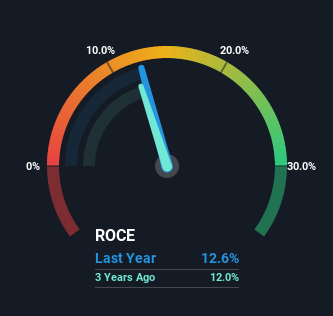- United Kingdom
- /
- IT
- /
- AIM:KWS
The Returns On Capital At Keywords Studios (LON:KWS) Don't Inspire Confidence
If you're looking for a multi-bagger, there's a few things to keep an eye out for. In a perfect world, we'd like to see a company investing more capital into its business and ideally the returns earned from that capital are also increasing. Put simply, these types of businesses are compounding machines, meaning they are continually reinvesting their earnings at ever-higher rates of return. Having said that, from a first glance at Keywords Studios (LON:KWS) we aren't jumping out of our chairs at how returns are trending, but let's have a deeper look.
What Is Return On Capital Employed (ROCE)?
If you haven't worked with ROCE before, it measures the 'return' (pre-tax profit) a company generates from capital employed in its business. Analysts use this formula to calculate it for Keywords Studios:
Return on Capital Employed = Earnings Before Interest and Tax (EBIT) ÷ (Total Assets - Current Liabilities)
0.13 = €73m ÷ (€744m - €161m) (Based on the trailing twelve months to June 2022).
Thus, Keywords Studios has an ROCE of 13%. In absolute terms, that's a pretty normal return, and it's somewhat close to the IT industry average of 11%.
Check out our latest analysis for Keywords Studios

Above you can see how the current ROCE for Keywords Studios compares to its prior returns on capital, but there's only so much you can tell from the past. If you'd like to see what analysts are forecasting going forward, you should check out our free report for Keywords Studios.
What Can We Tell From Keywords Studios' ROCE Trend?
On the surface, the trend of ROCE at Keywords Studios doesn't inspire confidence. Around five years ago the returns on capital were 21%, but since then they've fallen to 13%. Although, given both revenue and the amount of assets employed in the business have increased, it could suggest the company is investing in growth, and the extra capital has led to a short-term reduction in ROCE. If these investments prove successful, this can bode very well for long term stock performance.
On a related note, Keywords Studios has decreased its current liabilities to 22% of total assets. So we could link some of this to the decrease in ROCE. Effectively this means their suppliers or short-term creditors are funding less of the business, which reduces some elements of risk. Some would claim this reduces the business' efficiency at generating ROCE since it is now funding more of the operations with its own money.
The Key Takeaway
Even though returns on capital have fallen in the short term, we find it promising that revenue and capital employed have both increased for Keywords Studios. And the stock has followed suit returning a meaningful 81% to shareholders over the last five years. So should these growth trends continue, we'd be optimistic on the stock going forward.
One more thing, we've spotted 1 warning sign facing Keywords Studios that you might find interesting.
While Keywords Studios isn't earning the highest return, check out this free list of companies that are earning high returns on equity with solid balance sheets.
Valuation is complex, but we're here to simplify it.
Discover if Keywords Studios might be undervalued or overvalued with our detailed analysis, featuring fair value estimates, potential risks, dividends, insider trades, and its financial condition.
Access Free AnalysisHave feedback on this article? Concerned about the content? Get in touch with us directly. Alternatively, email editorial-team (at) simplywallst.com.
This article by Simply Wall St is general in nature. We provide commentary based on historical data and analyst forecasts only using an unbiased methodology and our articles are not intended to be financial advice. It does not constitute a recommendation to buy or sell any stock, and does not take account of your objectives, or your financial situation. We aim to bring you long-term focused analysis driven by fundamental data. Note that our analysis may not factor in the latest price-sensitive company announcements or qualitative material. Simply Wall St has no position in any stocks mentioned.
About AIM:KWS
Keywords Studios
Provides creative and technical services to the video game industry worldwide.
Flawless balance sheet with reasonable growth potential.
Market Insights
Community Narratives



